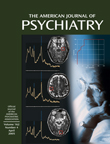Enhanced Early Morning Salivary Cortisol in Neuroticism
Abstract
OBJECTIVE: Neuroticism is a predisposing factor for major depression. The increase in salivary cortisol that follows waking provides a reliable measure of adrenocortical activity, and this response is increased in recovered depressed patients. This study compared waking cortisol levels in healthy subjects with high and low levels of neuroticism without a previous history of depression. METHOD: Salivary cortisol levels were measured upon waking and at 15-minute intervals for the next hour in volunteers selected to have high (>19/23) or low (<4/23) neuroticism based on the Eysenck Personality Inventory. RESULTS: Subjects with high neuroticism showed significantly greater levels of salivary cortisol 30 minutes after waking, which were maintained for the next half hour. CONCLUSIONS: Abnormalities in waking cortisol are associated with neuroticism in a way similar to those seen in major depression. Elevated waking cortisol may represent a vulnerability marker for mood disorder.



